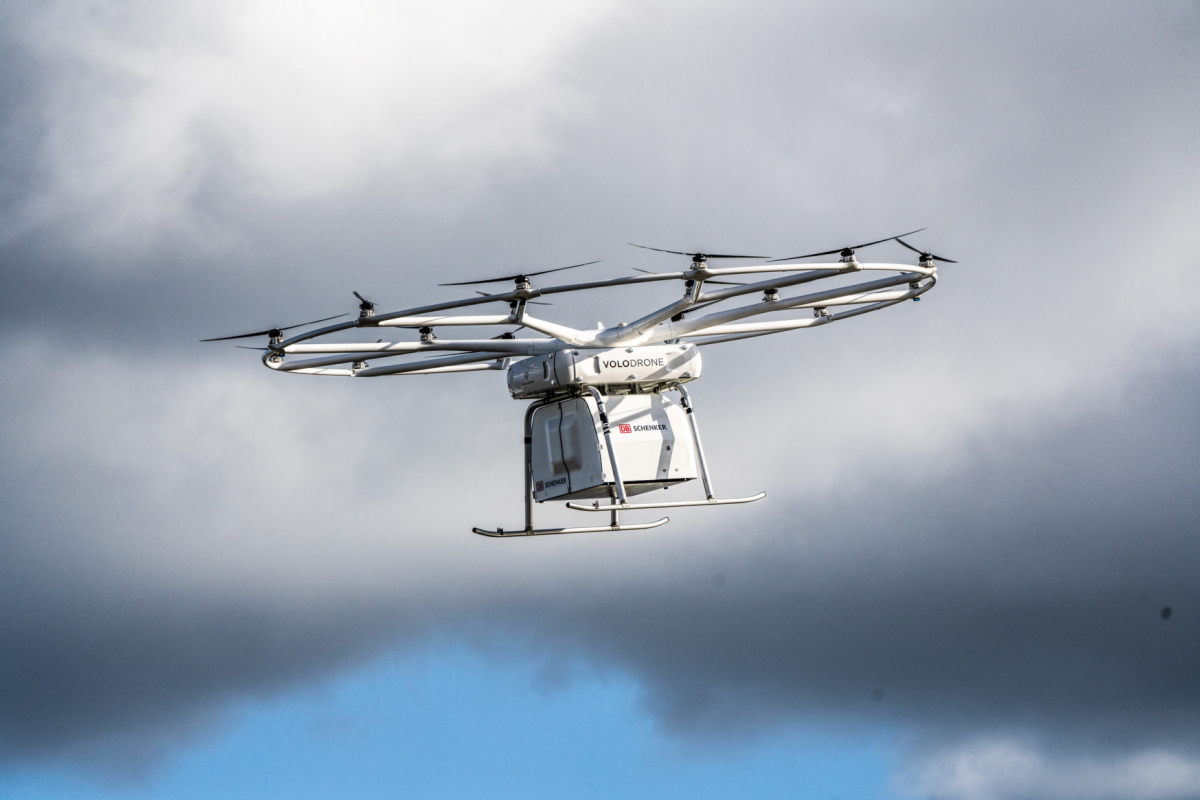Volocopter heavy-lift drone completes first public test flight
The first public test flight of the Volodrone heavy-duty drone from the air taxi manufacturer Volocopter took around three minutes. In the Hamburg port area, the drone delivered its cargo to a cargo bike.
On the sidelines of the international ITS mobility congress and in cooperation with the logistics service provider DB Schenker, the Bruchsal startup Volocopter let its heavy-duty drone Volodrone soar over the port of Hamburg. The project is designed as a joint effort by Volocopter and DB Schenker. The rail subsidiary joined Volocopter as an investor specifically for this purpose last year.
The load that the drone had to transport on Tuesday was not heavy. As part of a simulation, the electric cargo drone was equipped with a charging box between the landing gear, loaded and then flown to an electric cargo bike from DB Schenker. This then delivered the freight in a simulated manner. The two partners wanted to visualize how the logistics could be handled on a small scale and purely electrically in the future.
The Volodrone is loaded. (Image: Deutsche Bahn AG / Michael Neuhaus)
The Volodrone, which is equipped with 18 rotors, is designed for the transport of ISO pallets of all sizes with a weight of up to 200 kilograms. The unmanned, electrically powered drone has a range of 40 kilometers. With a diameter of 9.15 meters, a height of 2.15 meters and a maximum take-off weight of 600 kilograms, the Volodrone is quite an eye-catching appearance.
“Thanks to a standardized fastening system, the Volodrone can fulfill a variety of purposes and, for example, transport boxes, liquids or machines,” Volocopter tells us in a press release. “Wherever ground transport reaches its limits, the Volodrone can offer a new dimension of access via the air.”

DB Schenkers Cargo Bike takes over. (Image: Deutsche Bahn AG / Michael Neuhaus)
These can be places that are difficult to access in the mountains, at sea or in dense forest areas. With this aim in mind, Deutsche Post had also researched a drone, the so-called parcel copter. However, after a few years and a handful of model projects, he was secretly, quietly and quietly buried. The fate of the Volodrone remains to be seen. However, it is significantly larger and therefore probably more suitable in everyday life to generate a greater benefit than just flying a handful of blood tests from A to B – as the parcel copter did in its last pilot project.
In any case, the German federal government sees huge potential in drones – and not just in freight logistics. As part of an action plan, the vertical starters are to be established as everyday modes of transport in just a few years. A current study by the Unmanned Aviation Association assumes that the number of commercially operated drones in Germany will triple to 132,000 by 2025.



